人教版九年级英语全册重点单词 短语 语法
- 格式:docx
- 大小:407.23 KB
- 文档页数:15
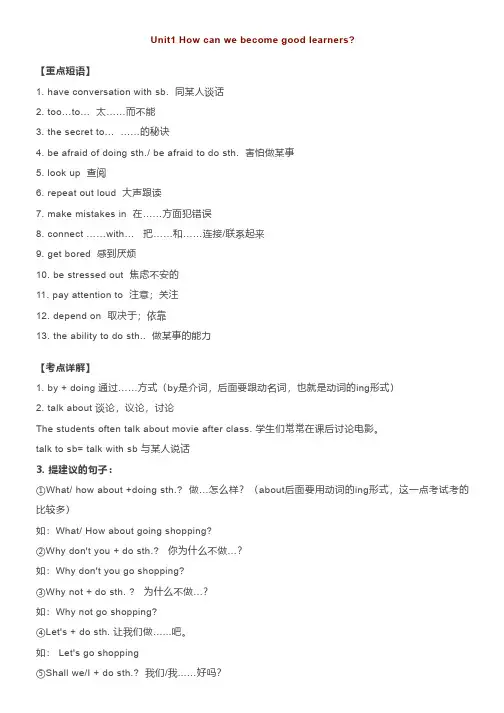
Unit1 How can we become good learners?【重点短语】1. have conversation with sb. 同某人谈话2. too…to… 太……而不能3. the secret to… ……的秘诀4. be afraid of doing sth./ be afraid to do sth. 害怕做某事5. look up 查阅6. repeat out loud 大声跟读7. make mistakes in 在……方面犯错误8. connect ……with… 把……和……连接/联系起来9. get bored 感到厌烦10. be stressed out 焦虑不安的11. pay attention to 注意;关注12. depend on 取决于;依靠13. the ability to do sth.. 做某事的能力【考点详解】1. by + doing 通过……方式(by是介词,后面要跟动名词,也就是动词的ing形式)2. talk about 谈论,议论,讨论The students often talk about movie after class. 学生们常常在课后讨论电影。
talk to sb= talk with sb 与某人说话3. 提建议的句子:①What/ how about +doing sth.? 做…怎么样?(about后面要用动词的ing形式,这一点考试考的比较多)如:What/ How about going shopping?②Why don't you + do sth.? 你为什么不做…?如:Why don't you go shopping?③Why not + do sth. ? 为什么不做…?如:Why not go shopping?④Let's + do sth. 让我们做…...吧。
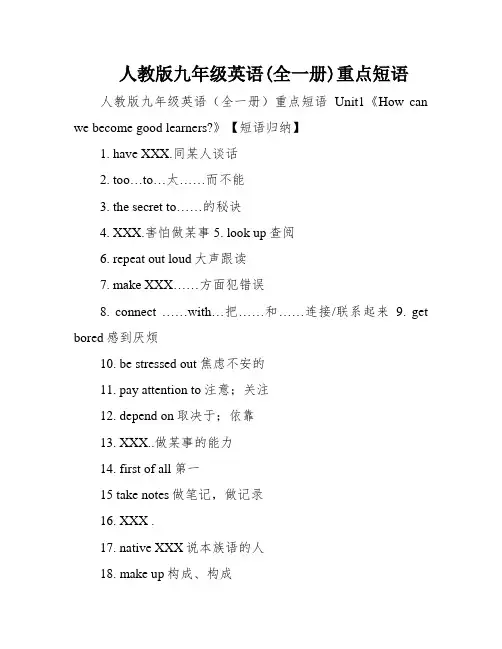
人教版九年级英语(全一册)重点短语人教版九年级英语(全一册)重点短语Unit1《How can we become good learners?》【短语归纳】1. have XXX.同某人谈话2. too…to…太……而不能3. the secret to……的秘诀4. XXX.害怕做某事5. look up查阅6. repeat out loud大声跟读7. make XXX……方面犯错误8. connect ……with…把……和……连接/联系起来9. get bored感到厌烦10. be stressed out焦虑不安的11. pay attention to注意;关注12. depend on取决于;依靠13. XXX..做某事的能力14. first of all第一15 take notes做笔记,做记录16. XXX .17. native XXX说本族语的人18. make up构成、构成19. be angry with sb.对某人生气20.each other彼此121.too many :许多,修饰可数名词too many girls22.too much :许多,修饰不可数名词too much milk23.much too :太,修饰形容词much too beautiful24.change… into…将…变为…25. with the help of sb. == with one's help在某人的帮助下with the help of LiLei == with LiLei's help在XXX的帮助下26. compare … to … :把…与…相比(compare with拿…和…比较)Unit2《I think that moon cakes are delicious!》【短语归纳】1. XXX Festival元宵节2. the Dragon Boat Festival端午节3. the Water Festival泼水节4. be fun to watch看着很成心义5. eat five meals a day一天吃五餐6. put on five pounds体重增加了五磅7. in two weeks两星期之后9. end up究竟成为;末了处于10. share sth. with sb.与……分享……11. as a result结果12. one,. . the other... (两者中的)一个……另外一个13. take sb. out for XXX带或人进来用饭214. dress up乔装打扮15. haunted house鬼屋16. call out高声呼叫招呼17. remind sb. of使某人想起18. sound like听起来像19. XXX以…对待某人20. XXX新生命的开始21. XXX.给或人某物;把某物给或人22. plan to do sth.计划做某事23.refuse to do XXX.回绝做某事Unit3《Could you please tell me where the restrooms are?》【短语归结】1. used to过去常常2. be afraid of畏惧3. From time to time经常;偶然4. turn red变红5. XXX up开始做6. deal/do with对付;应付7. not…anymore不再8. tons of attention良多存眷9. XXX忧郁310. be careful当心11. hang out闲逛12. give up放弃13. XXX考虑14. a very small number of极少数的(the number of)15. be alone独处16. give a XXX做演讲17. get to(arrive at/inreach).到达18. make a XXX call打电话19 save money省钱、存钱Unit4《I used to be afraid of the dark.》【短语归结】1. be XXX…更感兴趣.2. XXX的队员.3. be terrified of畏惧.4. gym class体操课.5. XXX担心.6. all the time一向,老是7. XXX与…闲谈8. hardly ever几乎从不9. walk to school = go to school on foot步行去上学4take the bus to school = go to school by bus乘车去上学10. as well as不仅…而且11. get into trouble with遇到麻烦12 .in the end最后13. make a decision下决定,下决心Unit5《What are the shirts made of?》【短语归纳】1. be made of由……制造2. be made in在……制造3. XXX情况保护4. be famous for以……而著名5. XXX……生产6. be known for以……闻名7. as far as I know据我所知8. pick by hand手工采摘9. send for发送XXX制止做某事11. everyday things日用品Unit6《When was it invented ?》【短语归纳】51. XXX偶然地;意外地2. without doubt毫无疑问的;的确3. by mistake毛病地;偶然中4. look up to钦佩;仰慕5. take place发生;出现6. all of a XXX突然;猛地7. XXX…into…把……分开8. the Olympics奥林匹克运动会9. the style of……的样式10. be used for被用于……11. in XXX century在第6世纪12. XXX around周游13.more than == over跨越(相比力,more than更重要)more than 300 == over 300 :跨越30014. over an open fire野饮Unit7《XXX》【短语归结】1. XXX.被允许干…allow sb. to do sth.允许某人干……XXX.允许干……2. sixteen-year-olds = sixteen-year-old boys and girls 16岁的6孩子3. part-time jobs兼职事情4. a driver’s license驾照5. on weekends在周末6. XXX在那个年龄段7. XXX XXX在上学日的晚上8. stay up熬夜9. clean up清扫10. fail(in)a test考试不及格11. take the test参加考试12. the other day前几天13. all my classmates我一切的同砚14. XXX全神贯注于15. be good for对…有益16. in groups成群的,按组17. get noisy吵闹(系表结构)18. learn from向或人进修19. at present目前,现在20. XXX.有做……的机遇21.the other day头几天22. at present目前23. at least最少24.at most最多XXX答复某人26. get in the way of :碍事,妨碍XXX.》【短语归纳】1. be long to属于2. XXX classical music听古典音乐3. XXX上学;求学;在学校4. go to the concert去听音乐会5. have any/some idea晓得6. a math test on algebra有关代数的数学测验7. the final exam期末测验8. because of因为9. a present for his XXX送给她妈妈的礼物10. run for exercise跑步锻炼11. catch a bus赶公车12.call the police报警Call the police!叫差人!13. anything strange一些奇怪的工具14 .get on上车15.get off下车Unit9《I like music that I can dance to.》8【短语归纳】1. XXX.盼望干…XXX期望某人干……2. catch up with追上,赶上3. different kinds of music各种不同的音乐4. XXX轻柔的歌曲5.take…to…带……到……6. remind…of…使某人想起或意识到…7. her own XXX她自己的歌曲8. be XXX对……重要9. Yellow River黄河10. Hong Tao’s latest movie洪涛最近的片子11.over the years多年来12. be sure to do sth.务必干……一定干……13. one of the best known Chinese photographers世界上最有名的中国摄影家之一14. on display展览,展出15. come and go来来往往16. can’t stand不能忍受17. most of ………的大多数18. keep XXX坚持安康19. get XXX聚在一起20 .be bad for sth.对…有坏处的XXX.做…有坏处21. for example,例如22. even if甚至23 different kinds of :各种各样different kinds of clothes :各种各样的衣服XXX》【短语归结】1. be XXX do被期望做,应该2. XXX握手3. for the first time第一次4. table manners餐桌礼仪5. drop by偶然拜访,顺便拜访6. after all究竟成效,究竟7. be on time准时8.(in)the wrong way以毛病的体式格局9. XXX对……比较随意10. a bit一点11 in time实时12. around the world =all over the world全天下13. point at 指向14. make mistakes犯错误(复数)make a XXX出毛病1015 .make XXX做鬼脸16. face to face面临面Unit11《Sad movies make me cry.》知识点【短语归纳】1. make me XXX使我困倦2. XXX使……发疯3. the more…,the more越……越…4. yes and no利害参半利害参半5. be friends with sb.是某人的朋友6. feel left out感觉被忽视7. sleep badly睡眠很差.8.don’t XXX XXX不想吃东西9. for no reason毫无理由10. XXX…XXX…既不……也不……11. let …down使…失望12. take one’s position替换我的职位13. to start with开初14. get the exam result back取测验成就单15. find out发觉16. XXX仍旧永远不幸福17. a shirt of a happy person一件快乐人的衬衫11Unit12《Life is full of the unexpected.》【短语归结】1. XXX洗浴2. XXX把背包忘在家里3. get back to school返回黉舍4. start XXX开始教学5. go off响铃6. rush out the door冲出房门7. give sb a XXX捎某人一程8. miss both events错过两个变乱9. full of XXX充满着不可预知性10. be about to do sth正要做某事11. XXX难以置信地盯着。
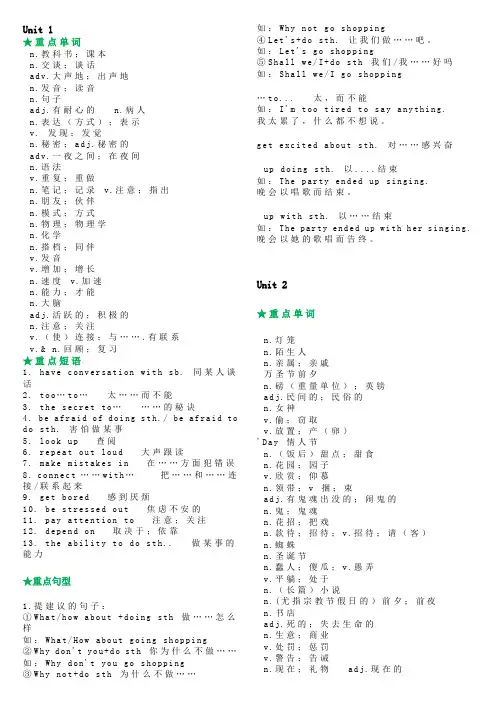
Unit 1★重点单词n.教科书;课本n.交谈;谈话a d v.大声地;出声地n.发音;读音n.句子a d j.有耐心的n.病人n.表达(方式);表示v.发现;发觉n.秘密;a d j.秘密的a d v.一夜之间;在夜间n.语法v.重复;重做n.笔记;记录v.注意;指出n.朋友;伙伴n.模式;方式n.物理;物理学n.化学n.搭档;同伴v.发音v.增加;增长n.速度v.加速n.能力;才能n.大脑a d j.活跃的;积极的n.注意;关注v.(使)连接;与…….有联系v.&n.回顾;复习★重点短语1.h a v e c o n v e r s a t i o n w i t h s b.同某人谈话2.t o o…t o…太……而不能3.t h e s e c r e t t o………的秘诀4. b e a f r a i d o f d o i n g s t h./ b e a f r a i d t od o s t h.害怕做某事5.l o o k u p查阅6.r e p e a t o u t l o u d大声跟读7.m a k e m i s t a k e s i n在……方面犯错误8. c o n n e c t ……w i t h…把……和……连接/联系起来9.g e t b o r e d感到厌烦10.b e s t r e s s e d o u t焦虑不安的11.p a y a t t e n t i o n t o注意;关注12.d e p e n d o n取决于;依靠13.t h e a b i l i t y t o d o s t h..做某事的能力★重点句型1.提建议的句子:①W h a t/h o w a b o u t+d o i n g s t h做……怎么样如:W h a t/H o w a b o u t g o i n g s h o p p i n g②W h y d o n't y o u+d o s t h你为什么不做……如:W h y d o n't y o u g o s h o p p i n g③W h y n o t+d o s t h为什么不做……如:W h y n o t g o s h o p p i n g④L e t's+d o s t h.让我们做……吧。
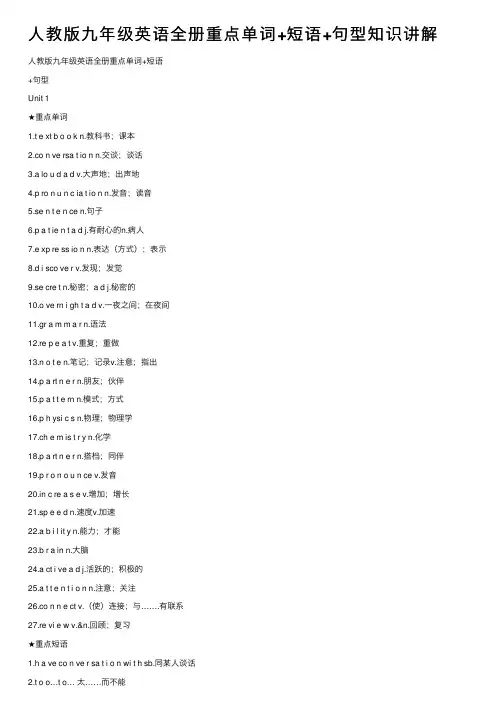
⼈教版九年级英语全册重点单词+短语+句型知识讲解⼈教版九年级英语全册重点单词+短语+句型Unit 1★重点单词1.t e xt b o o k n.教科书;课本2.co n ve rsa t io n n.交谈;谈话3.a lo u d a d v.⼤声地;出声地4.p ro n u n c ia t io n n.发⾳;读⾳5.se n t e n ce n.句⼦6.p a t ie n t a d j.有耐⼼的n.病⼈7.e xp re ss io n n.表达(⽅式);表⽰8.d i sco ve r v.发现;发觉9.se cre t n.秘密;a d j.秘密的10.o ve rn i gh t a d v.⼀夜之间;在夜间11.gr a m m a r n.语法12.re p e a t v.重复;重做13.n o t e n.笔记;记录v.注意;指出14.p a rt n e r n.朋友;伙伴15.p a t t e rn n.模式;⽅式16.p h ysi c s n.物理;物理学17.ch e m is t r y n.化学18.p a rt n e r n.搭档;同伴19.p r o n o u n ce v.发⾳20.in c re a s e v.增加;增长21.sp e e d n.速度v.加速22.a b i l it y n.能⼒;才能23.b r a in n.⼤脑24.a ct i ve a d j.活跃的;积极的25.a t t e n t i o n n.注意;关注26.co n n e ct v.(使)连接;与…….有联系27.re vi e w v.&n.回顾;复习★重点短语1.h a ve co n ve r sa t i o n wi t h sb.同某⼈谈话2.t o o…t o… 太……⽽不能3.t h e se cr e t t o… ……的秘诀4.b e a f r a id o f d o in g st h./b e a f ra id t od o st h.害怕做某事5.l o o k u p查阅6.r e p e a t o u t lo u d⼤声跟读7.m a ke m i st a k e s i n在……⽅⾯犯错误8.co n n e ct……wi t h… 把……和……连接/联系起来9.ge t b o re d感到厌烦10.b e st re sse d o u t焦虑不安的11.p a y a t t e n t io n t o注意;关注12.d e p e n d o n取决于;依靠13.t h e a b il it y t o d o st h..做某事的能⼒★重点句型1.提建议的句⼦:①W h a t/h o w a b o u t+d o in g st h?做……怎么样?如:W h a t/H o w a b o u t go in g sh o p p in g?②W h y d o n't yo u+d o st h?你为什么不做……?如:W h y d o n't yo u g o sh o p p in g?③W h y n o t+d o st h?为什么不做……?如:W h y n o t go sh o p p in g?④L e t's+d o st h.让我们做……吧。
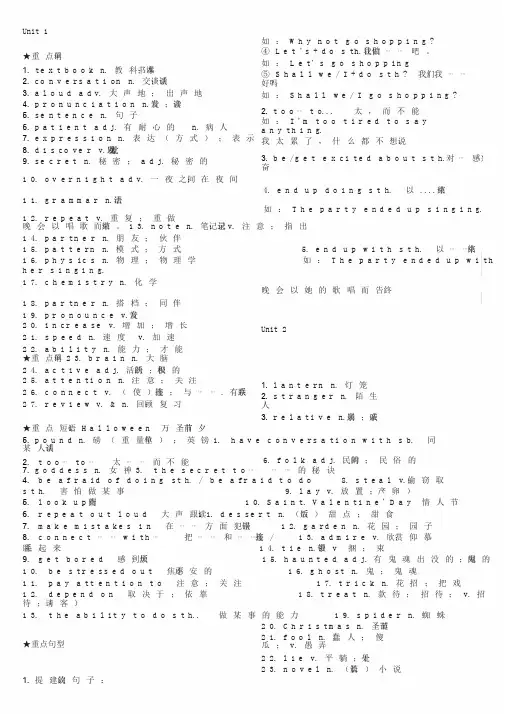
Unit 1如:W h y n o t g o s h o p p i n g ?★重点单词1.te x t b o o k n. 教科书;课本2.c o n v e r s a t i on n. 交谈;谈话3. a l o u d a d v. 大声地;出声地④L e t 's+ d o s th.让我们做⋯⋯吧。
如:L e t' s g o s h o p p in g⑤S h a l l w e / I + d o s t h ? 我们/我⋯⋯好吗?如:S h a l l w e / I g o s h o p p i n g ?4.p r o n u n c i a t i o n n.发音;读音5.s e n t e n c e n. 句子6.p a t i e n t a d j. 有耐心的n. 病人7. e x p r e s s i o n n. 表达(方式);表示2.t o o ⋯t o... 太,而不能如:I 'm t o o t i r e d t o s a y a n y th i n g.我太累了,什么都不想说。
8. d i s c o v e r v.发现;发觉9.s e c r e t n. 秘密; a d j. 秘密的 3. b e /g e t e x c i te d a b o u t s t h.对⋯⋯感兴奋1 0. o v e r n i g h t a d v. 一夜之间;在夜间4. e n d u p d o i n g s t h. 以 ....结束1 1. g r a m m a r n.语法如:T h e p a r t y e n d e d u p s i n g i n g.1 2. r e p e a t v. 重复;重做晚会以唱歌而结束。
1 3. n o t e n. 笔记;记录v. 注意;指出1 4. p a r tn e r n. 朋友;伙伴1 5. p a t t e r n n. 模式;方式 5. e n d u p w i t h s t h. 以⋯⋯结束1 6. p h y s ic s n. 物理;物理学如:T h e p a r t y e n d e d u p w i thh e r s i n g i n g.1 7. c h e m i s t r y n. 化学晚会以她的歌唱而告终。

Unit 1Section Amake word cards 制作词卡read the textbook 阅读课本listen to tapes 听磁带ask the teacher for help 求助老师study for a test 备考work with a group 小组合作have conversations with friends 和朋友们谈话 read aloud 朗读improve speaking skills 提高口语技能give a report 作报告a slow reader 一个阅读速度慢的人get the main ideas 获取大意at first 起初;开始read word by word 逐字读word groups 意群be patient with sb. 对某人有耐心It takes time. 这得花时间 / 这得慢慢来。
be afraid to do / of doing sth. 害怕做某事poor pronunciation 发音不好fall in love with ... 爱上……body language 身势语;肢体语言the expression(s) on one’s face 某人脸上的表情 listen for the key words 留神听关键词as well 也the secret to ... ……的秘诀language learning 语言学习It’s a piece of cake. 小菜一碟。
It serves you right. 你活该。
look up the word in a dictionary 在字典中查单词 take notes 记笔记memorize sentence patterns 记忆句型do grammar exercises 做语法练习keep a diary in English 用英语记日记Section Bincrease reading speed 提高阅读速度make mistakes in grammar 在语法方面犯错be born with ... 天生具有……the ability to learn 学习的能力depend on 取决于;依赖learning habits 学习习惯have ... in common 有……共同之处create an interest in ... 对……产生兴趣pay attention to 注意;关注connect ... with ... 把……和……连接或联系起来learn from mistakes 从错误中学习think about 考虑Use it or lose it. 非用即失。
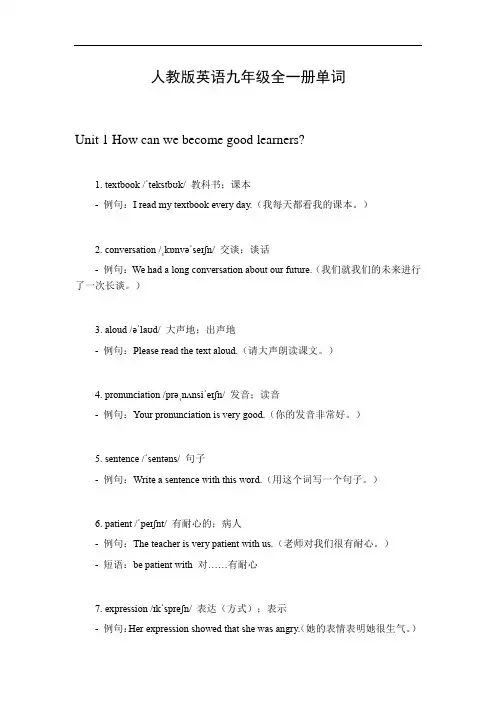
人教版英语九年级全一册单词Unit 1 How can we become good learners?1. textbook /ˈtekstbʊk/ 教科书;课本-例句:I read my textbook every day.(我每天都看我的课本。
)2. conversation /ˌkɒnvəˈseɪʃn/ 交谈;谈话-例句:We had a long conversation about our future.(我们就我们的未来进行了一次长谈。
)3. aloud /əˈlaʊd/ 大声地;出声地-例句:Please read the text aloud.(请大声朗读课文。
)4. pronunciation /prəˌnʌnsiˈeɪʃn/ 发音;读音-例句:Your pronunciation is very good.(你的发音非常好。
)5. sentence /ˈsentəns/ 句子-例句:Write a sentence with this word.(用这个词写一个句子。
)6. patient /ˈpeɪʃnt/ 有耐心的;病人-例句:The teacher is very patient with us.(老师对我们很有耐心。
)-短语:be patient with 对……有耐心7. expression /ɪkˈspreʃn/ 表达(方式);表示-例句:Her expression showed that she was angry.(她的表情表明她很生气。
)8. discover /dɪˈskʌvə(r)/ 发现;发觉-例句:Columbus discovered America.(哥伦布发现了美洲。
)9. secret /ˈsiːkrət/ 秘密;秘诀-例句:The secret of success is hard work.(成功的秘诀是努力工作。
)-短语:keep a secret 保守秘密10. look up (在词典、参考书中或通过电脑)查阅;抬头看-例句:If you don't know the word, you can look it up in the dictionary.(如果你不认识这个词,你可以查字典。
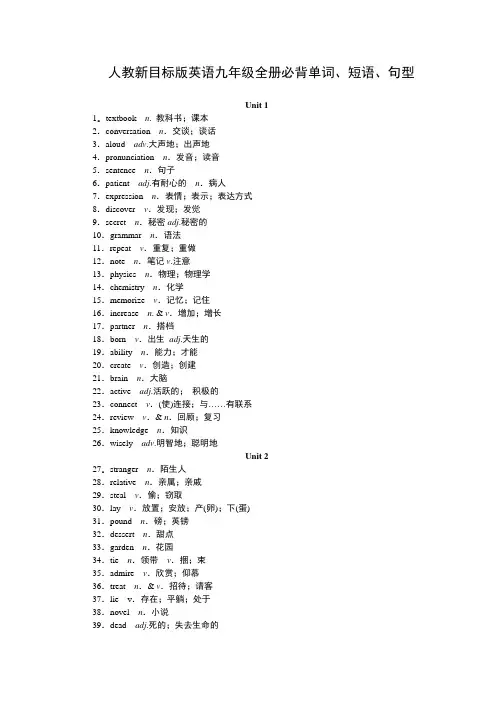
人教新目标版英语九年级全册必背单词、短语、句型Unit 11.textbook n. 教科书;课本2.conversation n.交谈;谈话3.aloud adv.大声地;出声地4.pronunciation n.发音;读音5.sentence n.句子6.patient adj.有耐心的n.病人7.expression n.表情;表示;表达方式8.discover v.发现;发觉9.secret n.秘密adj.秘密的10.grammar n.语法11.repeat v.重复;重做12.note n.笔记v.注意13.physics n.物理;物理学14.chemistry n.化学15.memorize v.记忆;记住16.increase n. & v.增加;增长17.partner n.搭档18.born v.出生adj.天生的19.ability n.能力;才能20.create v.创造;创建21.brain n.大脑22.active adj.活跃的;积极的23.connect v.(使)连接;与……有联系24.review v.& n.回顾;复习25.knowledge n.知识26.wisely adv.明智地;聪明地Unit 227.stranger n.陌生人28.relative n.亲属;亲戚29.steal v.偷;窃取30.lay v.放置;安放;产(卵);下(蛋)31.pound n.磅;英镑32.dessert n.甜点33.garden n.花园34.tie n.领带v.捆;束35.admire v.欣赏;仰慕36.treat n.& v.招待;请客37.lie v.存在;平躺;处于38.novel n.小说39.dead adj.死的;失去生命的40.business n.生意;商业41.punish v.处罚;惩罚42.warn v.警告;告诫43.present n.现在;礼物adj.现在的44.warmth n.温暖;暖和45.spread v.传播;展开n.蔓延;传播重点短语1.pay attention to注意;关注2.connect ... with把……和……联系起来3.take notes做笔记4.have a conversation谈话5.be born with天生具有6.put on (weight)增加(体重)7.lay out展开;布置8.be similar to与……相似9.end up最终成为;最后处于10.trick or treat不招待就使坏11.Christmas Eve圣诞节前夕12.dress up盛装打扮13.not only... but also...不仅……还……14.read aloud大声读必背句型1.What about listening to tapes?听磁带怎么样?2.It's too hard to understand spoken English.理解英语口语太难了。
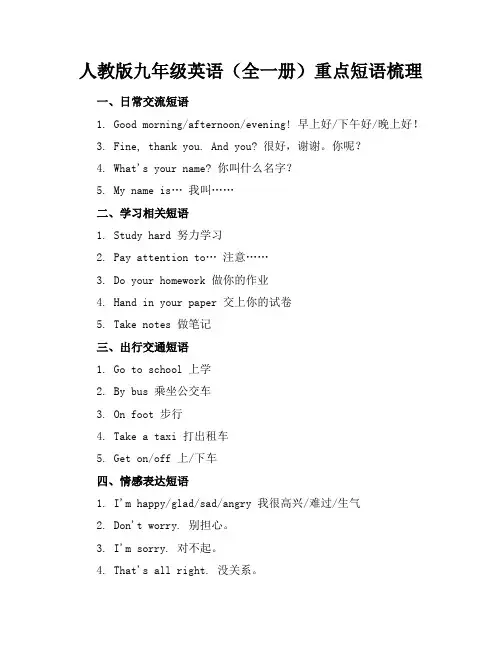
人教版九年级英语(全一册)重点短语梳理一、日常交流短语1. Good morning/afternoon/evening! 早上好/下午好/晚上好!3. Fine, thank you. And you? 很好,谢谢。
你呢?4. What's your name? 你叫什么名字?5. My name is… 我叫……二、学习相关短语1. Study hard 努力学习2. Pay attention to… 注意……3. Do your homework 做你的作业4. Hand in your paper 交上你的试卷5. Take notes 做笔记三、出行交通短语1. Go to school 上学2. By bus 乘坐公交车3. On foot 步行4. Take a taxi 打出租车5. Get on/off 上/下车四、情感表达短语1. I'm happy/glad/sad/angry 我很高兴/难过/生气2. Don't worry. 别担心。
3. I'm sorry. 对不起。
4. That's all right. 没关系。
5. Thank you. 谢谢你。
五、日常生活短语1. Have breakfast/lunch/dinner 吃早餐/午餐/晚餐2. Go shopping 购物3. Watch TV 看电视5. Do sports 做运动六、描述人物与外貌短语1. She is tall and thin. 她又高又瘦。
2. He has black hair. 他有黑色的头发。
3. She wears glasses. 她戴眼镜。
4. He is in his thirties. 他三十多岁。
5. She is dressed in a red dress. 她穿着一件红色的裙子。
七、时间与日期短语1. What time is it? 现在几点了?2. It's time for lunch. 到吃午饭的时间了。
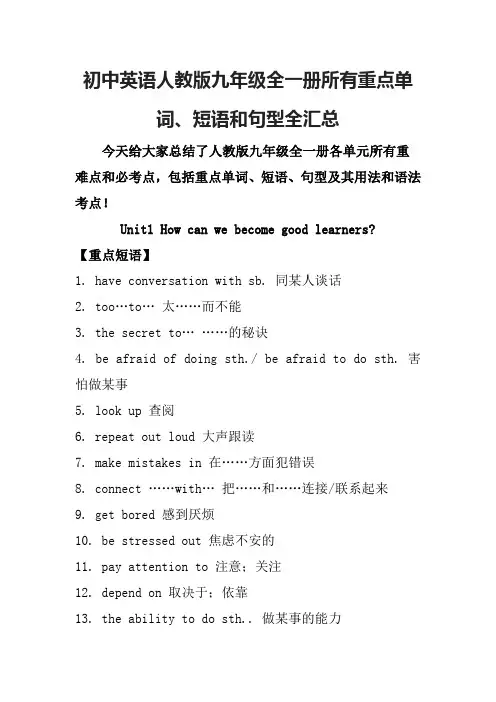
初中英语人教版九年级全一册所有重点单词、短语和句型全汇总今天给大家总结了人教版九年级全一册各单元所有重难点和必考点,包括重点单词、短语、句型及其用法和语法考点!Unit1 How can we become good learners?【重点短语】1. have conversation with sb. 同某人谈话2. too…to…太……而不能3. the secret to………的秘诀4. be afraid of doing sth./ be afraid to do sth. 害怕做某事5. look up 查阅6. repeat out loud 大声跟读7. make mistakes in 在……方面犯错误8. connect ……with…把……和……连接/联系起来9. get bored 感到厌烦10. be stressed out 焦虑不安的11. pay attention to 注意;关注12. depend on 取决于;依靠13. the ability to do sth.. 做某事的能力【考点详解】1. by + doing 通过……方式(by是介词,后面要跟动名词,也就是动词的ing形式)2. talk about 谈论,议论,讨论The students often talk about movie after class. 学生们常常在课后讨论电影。
talk to sb= talk with sb 与某人说话3. 提建议的句子:①What/ how about +doing sth.? 做…怎么样?(about后面要用动词的ing形式,这一点考试考的比较多)如:What/ How about going shopping?②Why don't you + do sth.? 你为什么不做…?如:Why don't you go shopping?③Why not + do sth. ? 为什么不做…?如:Why not go shopping?④Let's + do sth. 让我们做…...吧。
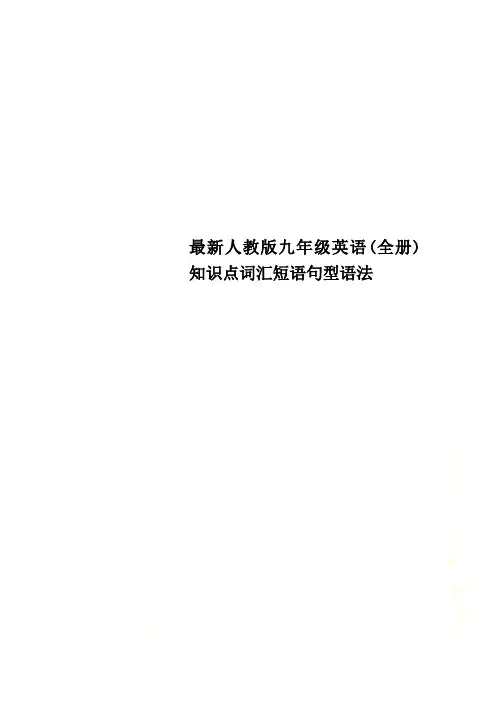
最新人教版九年级英语(全册)知识点词汇短语句型语法Unit 1I、重点词汇:1.pronounce—pronunciation2. differently—different—difference3. slowly—slow4. soft—hard5.easy—easily6.learn—learnerII、重点短语:1.lisen to tapes 听录音2. ask the teacher for help 向老师请求帮助3. read aloud 朗读4. speaking skills 口头表达能力5.spoken English 英语口语6. end up 结束ter on 以后,随后8. make mistakes 犯错,出错ugh at 嘲笑,取笑10.take notes 做笔记,做记录11.look …up (在词典、参考书等中)查阅,查找12. make up 编造,组成13.deal / do with 处理,应付14.be angry with 生……的气15.go by (指时间)过去,消逝16.try one’s best to do sth. 尽力做……17.break off 突然中止,中断18. with the help of 在……的帮助下19.regard…as…把……当做……20.be afraid of doing / to do sth 害怕做某事21. first of all 首先,开始22. have trouble / a difficult / hard time doing sth. 做某事有困难III、重点句型:1.It’s too hard to understand the voices. 理解那些话有困难。
2. How do you study for a test? 你怎么为考试而学习的?I study by listening to tapes. 我通过听磁带学习。
九年级英语全册必背精华短语1.look up (在词典、参考书中或通过电脑)查阅;抬头看2.be born with 天生具有3.pay attention to 注意;关注4.connect... with... 把......和......连接或联系起来5.put on 增加(体重);发胖y out 摆开;布置7.end up 最终成为;最后处于8.pass by 路过;经过9.pardon me 抱歉,对不起;什么,请再说一次10.from time to time 时常;有时11.deal with 应付;处理12.in public 公开地;在别人(尤指生人)面前13.be proud of/ take pride in 为......骄傲;感到自豪14.boarding school 寄宿学校15.in person 亲身;亲自16.be known for 以……闻名;为人知晓17.no matter 不论;无论18.have a point 有道理19.by accident 偶然;意外地20.take place 发生;出现21.without doubt 毫无疑问;的确22.all of a sudden 突然;猛地23.by mistake 错误地;无意中24.divide ... into 把⋯⋯分开25.not only...but also... 不但......而且......26.look up to 钦佩;仰慕27.talk back 回嘴;顶嘴28.keep…away from 避免接近;远离29.make one’s own decision 自己做决定30.get in the way of 挡⋯⋯的路;妨碍31.run after 追逐;追赶32.at the same time 同时;一起33.in that case 既然那样;假使那样的话34.stick to 坚持;固守35.plenty of 大量;充足36.shut off 关闭;停止运转37.once in a while 偶尔地;间或38.in total 总共;合计39.drop by 顺便访问;随便进入40.after all 毕竟;终归41.get mad 大动肝火;气愤42.make an effort to do sth作出努力做某事43.clean…off 把……擦掉44.take off 脱下(衣服);(飞机等)起飞45.go out of one’s way 特地;格外努力46.make ... feel at home 使(某人)感到宾至如归47.get used to 习惯于48.would rather (通常缩写为’d rather) 宁愿49.drive sb. crazy/mad 使人发疯/ 发狂50.the more … the more 越⋯⋯越⋯⋯;愈⋯⋯愈⋯⋯51.be friends with (sb.)成为某人的朋友52.leave out 忽略;不提及;不包括53.call in 召来;叫来54.neither ... nor 既不⋯⋯也不55.to start with 起初;开始时56.let…down 使失望57.kick sb. off 开除某人58.be hard on sb./ be strict with sb. 对某人苛刻;对某人要求严格59.rather than 而不是60.pull together 齐心协力;通力合作61.by the time 在......以前62.give ... a lift 捎(某人)一程63.in line with 与......成一排64.show up 赶到;露面65.by the end of 在(某时间点)之前66.sell out 卖光67.be harmful to 对......有害68.at the top of 在......顶部或顶端69.take part in 参加70.turn off 关掉71.pay for 付费;付出代价72.take action 采取行动73.throw away 扔掉;抛弃74.put sth to good use 好好利用75.pull…down 拆下;摧毁76.upside down 颠倒;倒转77.bring back 恢复;使想起;归还78.in a row 连续几次地79.look back at 回首(往事);回忆;回顾80.make a mess 弄得一团糟(一塌糊涂)81.keep one’s cool 沉住气;保持冷静82.senior high (school) 高中83.go by (时间)逝去;过去84.believe in 信任;信赖85.first of all 首先86.be thirty for 渴望;渴求87.be thankful to sb. 对某人心存感激88.ahead of 在……前面89.along with 连同;除......以外还90.be responsible for 对⋯⋯有责任;负责任91.set out 出发;启程92.separate from 分离;隔开。
九年级英语全册短语归纳to do sth.短语1.agree to do sth.同意做某事2.need to do sth.需要做某事3.want (sb.)to do sth.=would like to do sth. 想(某人)做某事4.expect (sb.) to do sth.期待某人做某事be expected to do sth.被期待做某事5.be supposed to do sth.应该做某事5.advise (sb.) to do sth.建议(某人)做某事6.encourage sb. to do sth.鼓励某人做某事7.seem to do sth.似乎做某事8.be excited to do sth.兴奋做某事9.ask sb. (not) to do sth.叫某人(不)做某事10.tell sb. (not) to do sth.告诉某人(不)做某事11. used to do sth. 过去常做某事12.be used to do sth.被用来做某事13. decide to do sth. 决定做某事14. try to d o sth. =try one’s best to do sth.=make an effort to do sth.尽力做某事15. learn to do sth. 学会做某事16. allow sb. to do sth. 允许某人做某事17.be allowed to do sth.被允许做某事should be allowed to do sth.应该被允许做某事18. refuse to do sth. 拒绝做某事19. It’s + adj.+ for sb. + to do sth. 对某人来说, 做某事怎么样20. offer to do sth. 主动提出做某事21. be able to do sth.能够做某事22. It takes sb. some time to do sth. 做某事花某人时间23.find+ it +adj. + to do sth.发现做某事怎样24.hope to do sth.希望做某事25. feel free to do sth. (可以)随便做某事26.be afraid to do sth.害怕做某事27.teach sb. to do sth.教某人做某事28.plan to do sth.=make plans to do sth.计划做某事29.be about to do sth.正要做某事30.guide sb. to do sth.指导某人做某事31.warn sb. (not) to do sth.警告某人(不)做某事32.dare to do sth.敢于做某事33.be ready to do sth.=be prepared to do sth. 准备做某事doing sth.短语1.have problems doing sth.=have trouble doing sth.=have difficulty doing sth 做某事有困难2. have fun doing sth.开心做某事3.keep (on) doing sth.=stick to doing sth. 继续,坚持做某事4.mind (sb.)doing sth.介意某人做某事5.be/get used to doing sth.习惯于做某事6.be used for doing sth.被用来做某事7.mean doing sth.意味着做某事8. put off doing sth. 推迟做某事9.be/become interested in doing sth.感兴趣做某事10. see sb. doing sth. 看见某人正在做某事11.hear sb. doing sth. 听见某人正在做某事12.finish doing sth. 完成做某事13. be busy doing sth. 忙于做某事14. give up doing sth.放弃做某事15. practice doing sth. 练习做某事16.succeed in doing sth.成功做成某事17.consider doing sth.=think about / of doing sth.考虑做某事18.look forward to doing sth.盼望做某事19.pay attention to doing sth.注意做某事20.stop/ prevent sb. from doing sth.阻止某人做某事21.dream of doing sth.梦想做某事22.feel kike doing sth.想做某事23.be afraid of doing sth.害怕做某事24.avoid doing sth.避免做某事25.spend time doing sth.花时间做某事26.end up doing sth. 以做某事而告终27.take up doing sth.开始从事做某事28.be close to doing sth.差点做成某事29.be worth doing sth.值得做某事30.suggest doing sth.建议做某事31.miss doing sth.错过做某事do sth.短语1. let sb. do sth. 让某人做某事2. make sb. do sth. 使某人做某事3. see sb. do sth. 看见某人做某事(整过程)4. hear sb. do sth. 听见某人做某事(整过程)5.would rather do sth.情愿做某事6.would rathr do A. than do B.宁愿做A 而不愿做B既to do sth.又doing sth. 短语(意思有所不同)1.remember to do sth 记得做某事remember doing sth 记得做过某事2.forget to do sth 忘记做某事forget doing sth 忘记做过某事3.stop to do sth 停下来去做某事stop doing sth 停止做某事4.regret to do sth.后悔做某事regret doing sth.后悔做过某事work with sb.与某人一起学习1.make word cards 制作单词卡片2.listen to tapes 听录音带3.ask sb. for help 向某人求助4.watch videos 看录像5.have conversations with sb.=talk with sb.和某人谈话6.too…to 太…而不能7.fall in love with 爱上…8.as well 也9.look up(在字典上)查阅;抬头看10.so that 以便;为了11.so...that.....=such...that...如此..以致...take notes 记笔记12.spoken English 英语口语13.make mistakes in 在…方面犯错14.depend on 取决于15.pay attention to 注意;关注16.connect…with 把…和…连接/联系起来17.get bored 感到厌倦18.be stressed out 感到焦虑不安19.each time=every time 每次;每当20.a little 有点;一点, 修饰不可数21.a few 一些,几个,修饰可数put on 增加(体重),发胖;穿上22.in two weeks 两周后,用在将来时23.sound like 听起来像,后接名词24.each other 相互;彼此25.in the shape of 呈…的形状26.on the Mid-autumn night 在中秋之夜27.shoot down 射下call out 叫喊;大声说出28.29. call in 召来,叫来lay out 摆开;布置30. dress up as 打扮成31. get dressed 穿衣服think of 认为,想起32. think back to 回想起think about 考虑play a trick/joke on sb.=play tricks/jokes on sb.开某人的玩笑 33. make money 挣钱34. remind sb. of sth.使某人想起某事35. wake up 醒来36. wake sb. up 叫醒某人at the beginning of …在…的开始37. give out=hand out 发放;分发38. a pair of 一对;一双39. get to=arrive at/in 到达40. on one’s left/right 在某人的左/右边41. turn left/right 向左/右转42. between …and …在…和…之间43. go past=pass by 经过;路过44. come on 来吧,加油45. on one’s way to 在某人去…的路上46. pardon me 抱歉;对不起;请再说一遍47. from time to time 时常;有时48. such a great idea 如此好的一个主意49. take up sth.开始从事某事50. deal with 应对;处理51. not …anymore=no longer=no more 不再 52. all the time 总是,一直53. get tons of attention 得到大量的关注54. fight on 继续奋斗55. a number of 大量,许多,后接可数名词56. a lot of=lots of=plenty of大量,许多,后接可数或不可数名词at least 至少57. in public 公开地;在公众面前58. on the soccer team 在足球队里59. be absent from classes 逃课60. send …to …把…送到…61. send for 派人去请send out 发出,发送make friends with sb.与某人交朋友62. be friends with sb.成为某人的朋友in person 亲身;亲自63. even though=even if 尽管;即使;纵然 64. take pride in=be proud of 为…感到自豪 65.be made of/from 由…制造/制作(材料)be made in 在…制造/制作(地点)be made into 被制成(成品)be made by 被....制作(人)be famous for 以……而著名66.67. be known for 以…闻名;为人知晓as far as I know 据我所知68. pick by hand 手工采摘69. all over the world=around the world 全世界 70. no matter 不论;无论71. everyday things=daily things 日用品72. find out 查明;弄清73. go on a vacation=take vacation 去度假74. paper cutting 剪纸75. such as=for example 例如76. turn …into …变成…77. be covered with 被…覆盖78. rise into 上升到;升入79. have a point 有道理80. at that time 在那时81. by accident 偶然;意外地82. by mistake 错误地;无意中fall into=drop into 落入;掉入83. make tea 制茶84. less than 少于85. more than 多于86. take place 发生;出现87. without doubt 毫无疑问;的确88. in disbelief 怀疑;难以置信地at a low price 以低价89. all of a sudden 突然;猛地90. work on 从事与;致力于91. work out 解决be similar to 与…类似92. in the end=at last 最后93. divide …into …把……分开……94. at the same time 同时95. the number of ……的数量96. look up to 钦佩;仰慕97. come up with=think out 想出98. driver’s license 驾照99. No way!没门!100. be worried about=worry about 担心101. get one’s ears pierced 打耳洞102. take photos/pictures 拍照;照相103. make sure 确信,确保104. keep sb. away from sth.使某人远离某物 105. keep away from sth.远离某物hurt oneself 伤到某人自己give sb. a hug 拥抱某人life up 举起106. 107. 108. 109. 110. 111. 112. 113. talk back 回嘴;顶嘴make one’s own decision 自己做决定give sb. chances to do sth.给某人机会做某事 move out 搬出来be strict with sb.=be hard on sb.对某人要求严格get in the way of 挡…的路;妨碍have nothing against 不反对be serious about 对…认真spend time/money on sth.在某事上花时间/钱spend time/money (in) doing sth.花时间/钱做某事 belong to sb.=be sb.’s 属于某人的at the picnic 在野餐上;野餐时the rest of …剩余的/其余的……pick up 捡起;拾起114. 115. 116. 117. 118. 119. 120. 121. 122. run away 跑掉run after 追逐;追赶not only …but also …不但……而且…… 123. communicate with sb.和某人交流124. point out 指出125. point at 指向along with 连同...一起,伴随着126. dance to 随着...跳舞127. in that case 既然那样128. cheer sb.up 使某人振奋129. shut off 关闭130. in time=once in a while 偶尔地,间或131. get married to sb. =marry sb.和某人结婚 132. in total 总共,合计133. shake hands 握手134. for the first time 第一次;首次135. as soon as 一……就……136. hold out 伸出137. to one’s surprise 使某人惊讶的是138. on both sides of 在…的两边139. drop by 顺便拜访;随便进入140. on time 准时141. in time 及时after all 毕竟;终归142. get mad 大动肝火143. no big deal=not a big deal 没什么大事144. clean …off 把……擦掉145. clean up 清洁,打扫take off 脱下(衣服);(飞机)起飞146. go out of one’s way 特地;格外努力147.make …feel at home 使(某人)感到宾至如归 be excited about 对…感到兴奋 show up 出现148. 149. 150. 151. 152. 153. 154. 155. 156. 157. 158. 159. 160. 161. 162. 163. 164. 165. 166. 167. 168. 169. 170. 171. 172. 173. 174. 175. 176. 177. drive/make sb. crazy/mad 使人发疯/发狂 have a lot in common 有许多共同之处 leave out 忽略;不提及;不包括 neither …nor …既不…也不… take one’s position/place 取代某人的位置 search for=look for 搜寻,寻找 let sb.down=disappoint sb.使某人失望 kick sb off 开除某人 knock on/at 敲击 rather than=instead of 而不是 pull together 齐心协力;通力合作 agree with sb 同意某人(的意见,观点) put pressure on sb.给某人施加压力 be full of 充满… by the time 在…以前 be late for class 上课迟到 go off(闹钟)响起 give …a lift 捎……一程 stare at 盯着看;凝视 wait in line 排队等候 stay up 熬夜sell out 卖光lose weight 减肥 run out of=use up 用光 write to sb.给某人写信 play a part in 参与…… cut down 减少cut off 切断cut up 切碎make a difference 起作用;有影响 lead to 导致;通向(某地) hear of=hear about 听说 throw away 扔掉 be harmful to=be bad for 对……有害 at the top of 在……顶端或顶部 178. 179. 180. 181. 182. 183. at the bottom of 在.....的底部 in the past/last few years 在过去几年里,与现在完成时连用 184. so far 到目前为止,与现在完成时连用 185. be good for 对……有好处 186. take part in 参加 187. turn off 关掉188. turn on 打开pay for 付费;付出代价 189. take action 采取行动 190. put sth to good use 好好利用某物191.pull down 拆下;摧毁 upside down 上下颠倒;倒转 set up 建立;开办 192. 193. 194. set out 出发,启程bring back 恢复;使想起;归还 195. win a prize 获奖 196. score goals 进球 197. in a row 连续几次地 198. take/have a break/rest 休息 199. be patient with 对……有耐心 200. no matter how 无论怎样 201. put in effort=make an effort 付出努力 202. look back at 回首(往事);回忆;回顾 203. prepare for 为……作准备 204. make a mess 弄得一团糟 205. keep one’s cool 沉住气;保持冷静 206. go by (时间)逝去;过去 207. believe in 信任;信赖 208. be thirsty for 渴望;渴求 209. be thankful to sb 对某人心存感激 210. ahead of=in front of 在……前面 211. be responsible for 对……有责任;负责任 212. separate from 分离;隔开 213. eat out 在外面吃饭 214. turn red 变红215. get good grades/scores 取得好成绩 216. so many/much 这么多 217. do well in=be good at 在...方面做得好 218. give a speech=make a speech 发言 219. according to 根据 220. fly a kite 放风筝 221. It is said that...据说 222. It is believed that....据认为 223. translate...into...把...翻译成.... 224. break the rule 违规 225. stay by one’s side 呆在某人身边 226. wear a suit and tie 穿西装戴领带 227. prefer A to B 比起 B 来,更喜欢 A228. prefer doing A to doing B 比起做 B 来,更喜欢做 A not much=nothing much 没什么 229. five minutes late 迟到 5 分钟 230. five minutes later 5 分钟后 value the time 珍惜时间 231. table manners 餐桌礼仪 232. be different from 与..不同 233. learn from mistakes 从错误中学习 234. nod in agreement 点头同意235.think to oneself 心里暗想 What bad luck!多倒霉啊! stay up (late) 熬夜 236. 237. 238. 239. 240. 241. 242. hundreds of 数百的 thousands of 成千上万的 at first=to start with=first of all 起初,首先 at the end of..在....末by the end of..在...结束之前。
Unit 1★重点单词、短语1.大声朗读read aloud2.英语口语spoken English3.逐字地word by word4.词组word group5.肢体语言body language6.查阅;抬头看look up7.大声重复repeat out loud8.记笔记take notes9.对……有更好的理解have a better understanding of10.记日记keep a diary11.爱上fall in love with12.关键字key words13.口语技能speaking skills14.和……交谈have conversations with15.犯错误make mistakes16.使发音正确get the pronunciation right17.天生具有be born with18.从错误中学习learn from mistakes19.注意;关注pay attention to20.害怕be afraid of21.取决于depend on22.把……和……连接或联系起来connect ... with★重点语法本单元语法重点:“by+v.-ing”结构详解。
“by+v.-ing”结构在句子中作方式状语,常用来表示“以、靠、借助、通过、用(某种方法或手段)”而达到某种预期的目的。
该结构常用来回答How do you...?之类的问题。
【拓展】★当by 和表示交通工具的名词连用时,它与名词之间不用任何限定词,且名词用单数形式。
They often go to school by subway. 他们经常坐地铁上学。
★by, in 和with 都可以表示“通过;借助”。
by 后接表示动作、行为的名词;in 表示“用某种语言;用某种材料”;with 后接表示物体或工具的名词。
如:You may send the book by post. 你可以通过邮局把书寄出去。
You can write it in English. 你可以用英语写。
He wrote the letter with a pen. 他用钢笔写这封信。
Unit 2★重点单词、短语1.泼水节the Water Festival2.互相泼水throw water at each other3.冲走wash away4.以……的形状in the shape of5.民间故事folk story6.增加(体重);发胖put on7.射落shoot down8.摆开;布置lay out9.赏月admire the moon10.与……相似be similar to11.喊叫;大声喊call out12.飞向fly up to13.乔装;打扮dress up14.捉弄某人play a trick on sb15.警告某人做某事warn sb to do sth16.最终成为;最后处于end up17.使某人想起某事remind sb of sth18.承诺做某事promise to do sth19.需要帮助的人people in need20.不给糖就捣乱trick or treat21.以……招待某人treat sb with sth★重点语法本单元语法重点:that, if 和whatever 引导的宾语从句。
A.宾语从句中的连接词的选择1.由that 引导的宾语从句:that 在从句中无词义,不作任何成分,常可省略。
如:Jenny said (that) she could finish her painting before supper. I think (that) you are right.2.由if 或whether 引导的宾语从句:if 或whether 引导宾语从句时,一般可通用,都表示“是否”。
如:I don’t know if / whether she still works there.I want to know if / whether there is a hospital in this street.但在下列情况下,只能用whether,而不能用if:(1)在whether ... or not 或whether or not 结构中,不能用if。
如:Nobody knows whether or not it will rain.(2)在介词之后用whether。
如:I’m interested in whether he likes English.B.主从句时态的呼应当主句是一般现在时态时,从句可用各种时态;当主句是一般过去时态时,从句常用过去的某种时态。
但当从句叙述的是客观事实或一般真理时,即使主句为过去时,宾语从句仍然用一般现在时态。
如:He said he would spend his holiday in Dalian. Our geography teacher told us that the sun rises in the east.Unit 3★重点单词、短语1.左转turn left2.以……开始start with3.在门口at the door4.去二楼go to the second floor5.路过;经过pass by6.寄一封信mail a letter7.在左边on the left8.礼貌地寻求帮助ask for help politely9.在不同的场合in different situations10.取决于depend on11.与……交流communicate with12.直接问题direct questions13.引入lead into14.地下停车场underground parking lot15.换一些钱change some money16.仅仅……是不够的it’s not enough to just ...17.如何做某事how to do sth★重点语法本单元语法重点:连接代词和连接副词引导的宾语从句。
1.由连接代词who, whom, whose, what, which 等引导,不能省略。
例如:Do you know who he is?2.由连接副词how, where, when, why 引导,也不可省略。
例如:I don’t know where I can buy this kind of camera.3.宾语从句用陈述句语序,即:连接词+ 主语+ 谓语+ 其他。
4.主句与从句的时态关系:(1)如果主句是一般现在时,从句可以是根据情况所需要的任何时态。
例如:I don’t know when she came here. Can you tell me when he will come here?(2)如果主句是过去的时态,从句也应用过去时态的某一种。
但若从句是表示客观事实或真理时,从句时态不受主句时态的限制,应用一般现在时。
例如:He told us why he would stay at home the next day. The teacher explained how the earth goes around the sun.5.某些由连接代词或连接副词引导的宾语从句可改为含“特殊疑问词+ 动词不定式”结构的简单句。
例如:Can you tell me where I can buy this book? → Can you tell me where to buy this book?Unit 4★重点单词、短语1.时常;有时from time to time2.变红turn red3.开始;从事take up4.应对;处理deal with5.成功之路the road to success6.取得好成绩get good scores7.被众人所关注;吸引无数目光get tons of attention8.公开地;在别人面前in public9.亲身;亲自in person10.缺席be absent from11.为……感到自豪take pride in12.为……骄傲;感到自豪be proud of13.做决定make a decision14.很难相信…… it’s hard to believe that...15.建议某人做某事advise sb to do sth★重点语法本单元语法重点:used to 的用法。
used to 是一个固定结构,意为“过去经常;以前常常”,其后接动词原形。
它表示过去存在某种状态或者过去的某种经常性、习惯性的行为或者动作。
1.其用于肯定句的结构为:主语+ used to + 动词原形+ 其他。
如:I used to play ping-pong with my brother. 过去我常常和我哥哥一起打乒乓球。
2.其用于否定句的结构为:主语+ didn’t +use to+ 动词原形。
如:You didn’t use to like action movies. 你过去不喜欢动作片。
3.其用于一般疑问句的结构为:Did + 主语+ use to+ 动词原形+ 其他? 如:Did your sister use to be shy? 你的妹妹过去害羞吗?【辨析】be used to (doing) sth 意为“习惯于(做)某事”,to 后可接名词、代词或动名词。
如:The students are used to the new teacher now. 学生们现在习惯这个新老师了。
They are used to raising their hands first when they want to ask questions. 他们习惯了问问题前先举手。
Unit 5★重点单词、短语1.日常用品everyday things2.高科技产品high-technology products3.避免做某事avoid doing sth4.据我所知as far as I know5.用手工by hand6.因……而出名be known for7.由……制成be made of8.传统艺术形式traditional art form9.把……变成…… turn... into10.被……覆盖be covered with11.剪纸paper cutting12.已经存在…… have been around for...13.用剪刀剪cut with scissors14.把……张贴在窗户上put sth on windows15.上升到;升入rise into★重点语法本单元语法重点:一般现在时的被动语态。